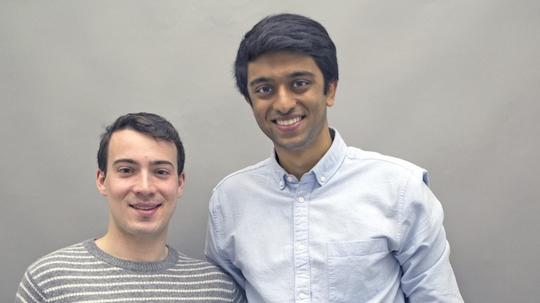
When I bumped into Jonah Kallenbach at a Rough Draft Ventures event in April, he told me he wasn’t ready to talk about his startup, which he briefly described as a venture at the intersection of tech and biology.
As it turned out, Kallenbach and his co-founder, roommate and fellow Harvard graduate Hirsh Jain, have been making a series of moves to launch their business, including raising $25,000 from Rough Draft Ventures, joining the Harvard i-Lab’s Venture Incubation Program - the same of Alex Tavares, who is working on a device to help blind people learn Braille - and winning the $5,000 TECH Outstanding Startup Award at the Harvard’s i3 Challenge.
“We would like to get to a place where pharmaceutical companies can use us effectively to begin the drug design pipeline."
Started around two years ago as a final project for a graduate machine learning class, the company officially launched in January this year.
The venture is called Reverie Labs, a name that Jain and Kallenbach selected, among many other reasons, as a homage to the HBO show Westworld. A biotech startup with computer science at its core, the company is planning on using artificial intelligence techniques to help pharmaceutical companies improve their drug design process.
“We would like to get to a place where pharmaceutical companies can use us effectively to begin the drug design pipeline,” Jain said.
With an analogy, the first step of designing a new drug can be described as having a palace full of thousands of billions LEGO bricks. What LEGO bricks should I use to form a given layout? What is the most efficient way to find them? Answering this questions requires time and multiple testings, most of them resulting in red herrings.
From the pharmaceutical industry standpoint, the LEGO bricks are the molecules and the given layout is the protein that will end up in the drug. What Reverie Labs is doing to address the situation is using machine learning algorithms to screen massive libraries of molecules and identify the ones that have the higher chances to bind, making them the best “LEGO bricks” possible to ultimately build a desired drug.
In the vision of the two co-founders, the pharmaceutical company could contact Reverie Labs and the company would send back a list of compounds or scaffolds.
“I think it would be very very cool if we were able to work on a drug discovery program that actually leads to a drug, which ended up in real humans,” Kallenbach said.
Photo courtesy of Adam Zewe.








